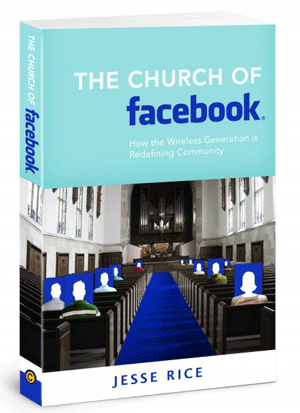 Name of the Book: The Church Of Facebook: How the Hyperconnected Are Redefining Community
Name of the Book: The Church Of Facebook: How the Hyperconnected Are Redefining CommunityAuthor: Jesse Rice
Publisher: David C Cook, Colorado Springs
Year of Publication: 2009
Book Review Notes by: Dr. J.N. Manokaran
Jesse Rice is a writer and musician and is a well known as worship leader. He has brought out this fabulous book on the new digital generation youth.
In the first chapter of Introduction, he writes the story of opening of Millennium Bridge in London in 10 June 2000. When people started walking on that bridge, there were wobbling, the bridge swayed from one end to the other. Media dubbed that bridge as a flop. People began to sync their actions and there was a spontaneous order. There were three outcomes (P.20-21):
- There is a force that is capable of synchronizing a large population in very little time, thereby creating spontaneous order.
- This spontaneous order can generate out comes that are entirely new and unpredictable.
- These unpredictable outcomes require the affected population to adapt their behavior to more adequately live within the new spontaneously generated order.
Connection
 Researchers have found connection as key to happiness. Harry Harlow a scientist did research with new born monkeys. In his research he was able to find that comforting connection is more needed than food. The monkey needed psychological resource or emotional attachment. Human need for connection is well realized when there is a disconnection. Dropped cell phone calls or the loss of a job – ‘each kind of disconnection alerts us to the fact that we were meant to connect.’
Researchers have found connection as key to happiness. Harry Harlow a scientist did research with new born monkeys. In his research he was able to find that comforting connection is more needed than food. The monkey needed psychological resource or emotional attachment. Human need for connection is well realized when there is a disconnection. Dropped cell phone calls or the loss of a job – ‘each kind of disconnection alerts us to the fact that we were meant to connect.’ In 2006 BBC reported an experiment with six individuals who were to under go 48 hours of sensory deprivation. That brought out two prominent results: 1) ‘Cut off from connection, our ability to make sense of the world begins to break down.’ 2) ‘our ability to cope with reality begins to dissolve.’
‘Disconnection seems to leave us locked in little rooms with no light source and no sense of when the madness with end.’ Human beings need quality connection. Adam needed the suitable partner to relate and to connect.

Revolution
Willis Havilland Carrier invented the modern air-conditioning. In 1924, J.L. Hudson Deparment Store in Detroit, Michigan was the first store to offer an ‘air-conditioned’ experience, which triggered the rise of supermarket. Private home air-conditioning began in 1914 but became popular only in 1948. This caused shift in architecture, geographic development, and how people related with one another. The entertainment and social events moved indoors. This invention changed the way people eat, shop, manufacture, work, advertise, sell good, live, play, build, travel and relate.
 Mark Zuckerberg is the founder and CEO of Facebook. “Facebook has two ‘newsfeeds,’ a personal one unique to your Facebook home page, and a corporate one, available for reviewing by all of your ‘friends’. The combination of these two feeds is what Facebook calls ‘the stream’” (p.68) “Facebook wa, in many ways, simply the next generation of software that could ‘learn’ your personal preferences and customize advertisements just for you.” (P.69) “An entire entrepreneurial culture has sprung up around the application development on Facebook, with more than 700 000 developers generating 140 new applications every day.” (p.71). 70 percent of Facebook members were from outside U.S. in 2009. Facebook has universal appeal to people of every age. Facebook is becoming multimedia platform with 850 million photos uploaded to Facebook every month and 7 million videos in 2009.
Mark Zuckerberg is the founder and CEO of Facebook. “Facebook has two ‘newsfeeds,’ a personal one unique to your Facebook home page, and a corporate one, available for reviewing by all of your ‘friends’. The combination of these two feeds is what Facebook calls ‘the stream’” (p.68) “Facebook wa, in many ways, simply the next generation of software that could ‘learn’ your personal preferences and customize advertisements just for you.” (P.69) “An entire entrepreneurial culture has sprung up around the application development on Facebook, with more than 700 000 developers generating 140 new applications every day.” (p.71). 70 percent of Facebook members were from outside U.S. in 2009. Facebook has universal appeal to people of every age. Facebook is becoming multimedia platform with 850 million photos uploaded to Facebook every month and 7 million videos in 2009. 
Facebook facilitates four homelike qualities:
1) Home is where we keep all the stuff that matters most to us. People like to record our histories, so 850 million photos are uploaded every month. As we decorate our homes with bible verses, Facebook provides avenues to express our values and beliefs.
2) Home is wherever we find family. ‘Facebook facilitates quick and easy homelike moments with family and friends from around the world despite any geographical barriers.’
3) Home is where we feel safe because we can control the environment. The privacy controls helps to have control over the digital world by determining to allow certain friends to see certain things, ignoring friendship requests etc.
4) Home is where we can be ‘just be ourselves’.
Dispensation
People let know about themselves by providing a picture to represent them in Facebook. “Control is key to our sense of well-being. When we believe we have a reasonable amount of control over our lives, then we feel optimistic and hopeful.” (p.99). The average American cannot say ‘no’. Overchoice keeps people average because it prevents people from focusing in for very long on one thing.
Multi-tasking and Continuous Partial Attention (CPA) are two different things. Multi-tasking is motivated by a desire to be more productive and efficient. In CPA people are motivated by a desire not to miss anything. So CPA means to be always on high alert. It seems that the more power we have – in the form of more choices – the more powerless we feel. Average social network of a person is 150. When they are more connected, the quality of connection suffers.
 Relationships require time. But in Facebook people have just enough time for a quick wall posting, a shared video link or a one sentence status update. The communication in Facebook if often one way. People end up communicating in order to get a reaction. “As we develop through adolescence, living for what psychologists call an ‘imaginary audience’ is part of how we organize our inner worlds.” (p.111). “In effect the hyperconnection of Facebook changes the nature of our relationships by turning our friends into audience and us into performers.” (p.112) Facebook is mostly a ‘culture of status’. Self-revelations are largely to gain more of that status. “The problem with this, of course, is that relationships rooted in status-seeking and public showcasing are composed of entirely different DNA than those rooted in qualities like emotional maturity and respectful boundaries.” (p.113).
Relationships require time. But in Facebook people have just enough time for a quick wall posting, a shared video link or a one sentence status update. The communication in Facebook if often one way. People end up communicating in order to get a reaction. “As we develop through adolescence, living for what psychologists call an ‘imaginary audience’ is part of how we organize our inner worlds.” (p.111). “In effect the hyperconnection of Facebook changes the nature of our relationships by turning our friends into audience and us into performers.” (p.112) Facebook is mostly a ‘culture of status’. Self-revelations are largely to gain more of that status. “The problem with this, of course, is that relationships rooted in status-seeking and public showcasing are composed of entirely different DNA than those rooted in qualities like emotional maturity and respectful boundaries.” (p.113). “You and I were made to participate in a divine ordering of management of affairs and events in the world – a dispensation. We were made to have a small piece of the world over which we have creative influence. The appeal behind owning and operating our own island – even behind creating and maintaining a Facebook profile-is a truth embedded deeply in our hearts. It is our nature to rule and to do so in partnership with God and in partnership with others.” (p.117)

Illumination
“The ‘seeing’ world, it turns out, is one of overwhelming chaos to a formerly blind person.” (p.126). He writes about Vigil who was able to see after many decades had difficulty in handling the new ability to see. Facebook is fuzzy in relationship to 1) privacy and authority 2) peer and romantic relationships and 3) time management and personal identity. “Facebook is indeed reinventing and tearing at traditional boundaries, stirring up a hornet’s nest of new issues related to privacy as employers befriend employees, teachers ‘add’ students, and parents friend request their children.” (p.131)
“One of the most interesting things about cyberspace is that it doesn’t forget. If you’ve downloaded it, posted it, searched for it, or looked at it, there is probably a record of the event floating ‘out there’ somewhere.” (p.131) What is posted as fun could be interpreted as lack of judgment by someone who does ot understand the context.
Deciding to ‘confirm’ or ‘ignore’ itself is a source of anxiety. Few want to be losers by having fewer friends.
Now mobile phones have become tools to hear music, browse Internet, get direction, check and respond to emails, share photos, and text messages. There are tens of millions who check Facebook every hour and several times in an hour.
 The status updates in Facebook are like personal headlines. Everyone in the Facebook is being watched, so people are more likely to change behaviour. The capacity to be alone, reflect is being lost. The cultivation of healthy self-concept is missing because of being always-on. Personal polling in the Facebook helps a person to make decisions. Voices that say what to do is increasing and are getting louder. So self-confidence for taking decision is lacking. In many ways Facebook members are everconnected to anywhere except here and now. “There can be no clarity of direction, without clarity of self.” (p. 148) “Our lives unfold moment by moment, and the only way we can truly experience them is in the moment. Being always-on can thwart awareness of the present moment.” (p. 149)
The status updates in Facebook are like personal headlines. Everyone in the Facebook is being watched, so people are more likely to change behaviour. The capacity to be alone, reflect is being lost. The cultivation of healthy self-concept is missing because of being always-on. Personal polling in the Facebook helps a person to make decisions. Voices that say what to do is increasing and are getting louder. So self-confidence for taking decision is lacking. In many ways Facebook members are everconnected to anywhere except here and now. “There can be no clarity of direction, without clarity of self.” (p. 148) “Our lives unfold moment by moment, and the only way we can truly experience them is in the moment. Being always-on can thwart awareness of the present moment.” (p. 149) Adaptation
There are four qualities of being a community:
1) having shared history and a sense of identity,
2) permanence – how you get the shared history,
3) proximity and
4) shared imagination about the future.
 What happens online is connection and not community. Virtual community is like playing guitar with one string. Younger generation understands community as combination of online and real community. Adaptation is required in the changing environment. In marriage one offers security, intimacy and freedom which is reciprocated by other. That means accepting responsibility and also submit to one another.
What happens online is connection and not community. Virtual community is like playing guitar with one string. Younger generation understands community as combination of online and real community. Adaptation is required in the changing environment. In marriage one offers security, intimacy and freedom which is reciprocated by other. That means accepting responsibility and also submit to one another. Regeneration
Like the Samaritan woman, thirsty people come to Facebook to take a drink. Jesus met the Samaritan woman with
1)Intentionality,
2) Humility and
3) Authenticity.
Hyperconnectivity can lead us to hyper activity and not intentionality. Living with intention means to live with purpose. When we respond with knee-jerk reactions to emails, messages. we are at the mercy of other people needs and wants.
People who spend lot of time on screen are called ‘screen suckers’. They forget to eat meal. Busyness is the number one enemy of mindfulness. We tend to say, ‘when I have a job”, ‘when I have promotion’; ‘When I get married’…indicating procrastination tendencies. For such only option left is: “When I die”. Many live in forced procrastination. “At the digital all-you-can-eat buffet, we don’t have to stuff ourselves until we throw up.” (193)
 Humility is always transformative. “Humility does not mean we constantly turn a deaf ear to our wants and needs in service of others. True humility always honors both ourselves and others, at the same time.” (p.196). “Facebook, and the Internet in general, rewards those who are most clever, not those with the most character. Unfortunately cleverness has the lifespan of a sickly gnat. Clever ideas, trends, and people pop up then fade away just as quickly. Cleverness has no staying power.” (p.197) Life alienating communications happen due to moralistic judgements, making comparisons and by denial of responsibility.
Humility is always transformative. “Humility does not mean we constantly turn a deaf ear to our wants and needs in service of others. True humility always honors both ourselves and others, at the same time.” (p.196). “Facebook, and the Internet in general, rewards those who are most clever, not those with the most character. Unfortunately cleverness has the lifespan of a sickly gnat. Clever ideas, trends, and people pop up then fade away just as quickly. Cleverness has no staying power.” (p.197) Life alienating communications happen due to moralistic judgements, making comparisons and by denial of responsibility. It takes courage to be real in the online social network sites. Jesus was honest with Samarian woman. He did not use woman’s personal information against her to create an artificial intimacy, the way it is done online. The temptation to misrepresent ourselves in Facebook is a serious concern.

How to handle Facebook:
1)Practice regular check-ins.
2) Make the intention to not go online immediately before bed and immediately after waking up.
3) Practice mindful Facebooking (examine how much time you spend each day),
4) Practice authentic Facebooking;
5) Adopt one or two Facebook friends for one month.
Book worth reading
The book is a honest appraisal of social networking sites. It brings out the best in the modern digital world, it pitfalls and pragmatic suggestions to handle these well. Using these platforms for communicating Christ to younger generation. It is a good book that should be read by Christian leaders especially the pastors and youth workers.
Rev. Dr. J.N. Manokaran,
Managing Director,
Trainers of Pastors International Coalition (TOPIC)
6B1 Doshi Flats, 59 Chetty Street,
Ayanavaram, Chennai 600023 India

Leave a Comment: